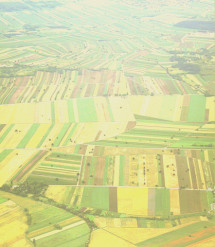Agricultural Innovation: Sustaining what agriculture? For what European bio-economy? Co-operative Research on Environmental Problems in Europe (CREPE) report
The Europe 2020 strategy's promotion of resource-efficient technologies and market incentives as the solution for sustainable agriculture is contradicted by experience where techno-fixes and market pressures have increased overall demand on resources.

Authors
Summary
Nowadays most innovations are promoted under the banner of ‘sustainable development’, but there are different accounts of what is to be sustained. Likewise sustainable agriculture has different accounts, so it has become an ambiguous concept – even a contentious one. Its diverse meanings were explored by a project, ‘Co-operative Research on Environmental Problems in Europe’ (CREPE), in which civil society organisations led studies in cooperation with other CSOs and academic researchers. These studies analysed different accounts of sustainable agriculture and proposals for remedies.
As a policy framework for sustainable development, the Europe 2020 strategy promotes resource-efficient technologies and market incentives, thus attributing sustainability problems to inefficiency. However, this prevalent diagnosis has been contradicted by experience: through a rebound effect, efficient techno-fixes have often increased overall demand on resources. EU policy expects greater efficiency to help conserve water, yet more efficient irrigation techniques have increased financial incentives to expand cultivation and thus water usage in southeastern Spain. Likewise EU policy expects that future novel biofuels will help avoid the resource conflicts over current biofuels, yet these conflicts arise fundamentally from a drive to supply growing global markets. Market-competitive pressures on natural resources cannot be alleviated by efficient techno-fixes.
As a policy framework for reshaping agriculture, the Knowledge-Based Bio-Economy (KBBE) links sustainability, renewable resources, economic competitiveness, research priorities and technological innovation. The KBBE has been defined as ‘the sustainable, eco-efficient transformation of renewable biological resources into health, food, energy and other industrial products’. Broadening the scope of agriculture, this concept also encompasses diverse diagnoses of unsustainable agriculture and eco-efficient remedies. In the dominant account, agriculture becomes a biomass factory supplying raw materials for diverse industrial products. In agroecological accounts, by contrast, agricultural methods incorporate and enhance farmers’ knowledge of natural resources, as a basis for them to gain from the value that they add.
For the latter account, remedies include enhancing biodiversity in crops and cultivation methods through agroecological knowledge. This has been developed via cooperative exchanges among farmers, sometimes also with professional researchers. However, such cooperation faces many barriers, for example: there are cultural differences among potential participants; and research institutions give priority to complex, expensive and commercialisable science. So knowledge mediators have an important role in helping to overcome these barriers.
Beyond the formal research system, Agricultural Knowledge Systems (AKS) link many knowledges relevant to sustainable agriculture and a bio-economy. Shorter agro-food chains have supplied local, organic and/or higher-quality food to more consumers. Bringing them closer to producers also builds knowledge of agro-ecological cultivation methods and consumer support for them. In Brittany, a context dominated by agro-industrial methods, some farmers have rapidly developed short food chains in the past decade. These new markets have given farmers incentives for methods reducing their energy inputs – initially for cost reduction, and later for environmental care. Already available, such methods could be implemented rapidly and at low cost; the main obstacles seem to be farmers’ and institutional mindsets.
In the above initiatives, citizen networks become experimental co-creators of knowledge. As forms of social innovation, these practices create participatory, cooperative arenas where people are empowered and create alternatives to the dominant agenda. The CREPE project has illuminated and facilitated such practices, especially by helping civil society organisations (CSOs) to extend their stakeholder and expert networks.
In exploring divergent accounts of innovation for sustainable agriculture and a bio-economy, the project shows how each one uses similar key terms according to its different vision of the future (see Table 1). Such divergences arise in many policy issues – e.g., agricultural research priorities, the post-2013 CAP, territorial development, a low-carbon economy, intellectual property and science education. Different visions contend for influence over European futures. The divergence highlights societal choices, whose legitimacy will depend on citizens shaping the future. Some choices have been highlighted by the CREPE project – itself a social experiment in research cooperation.
Pages: 32

